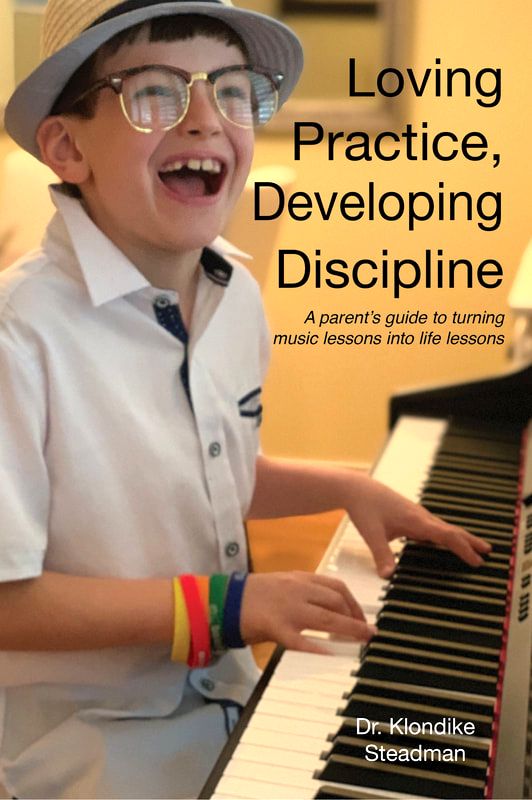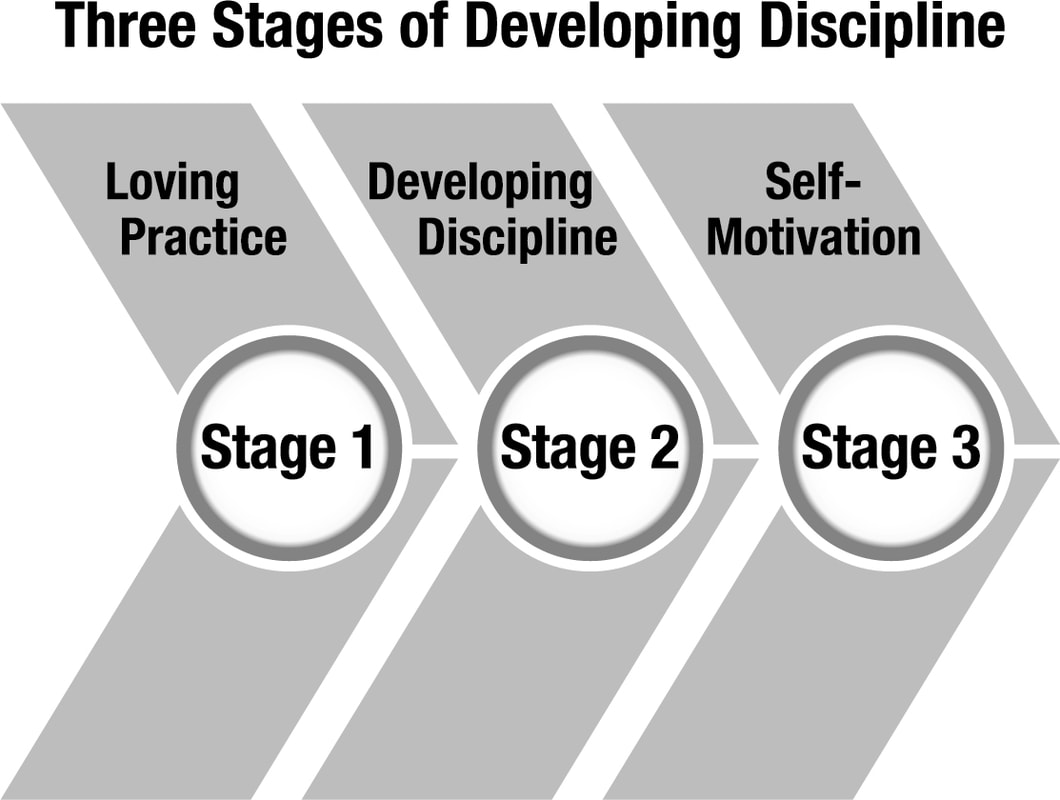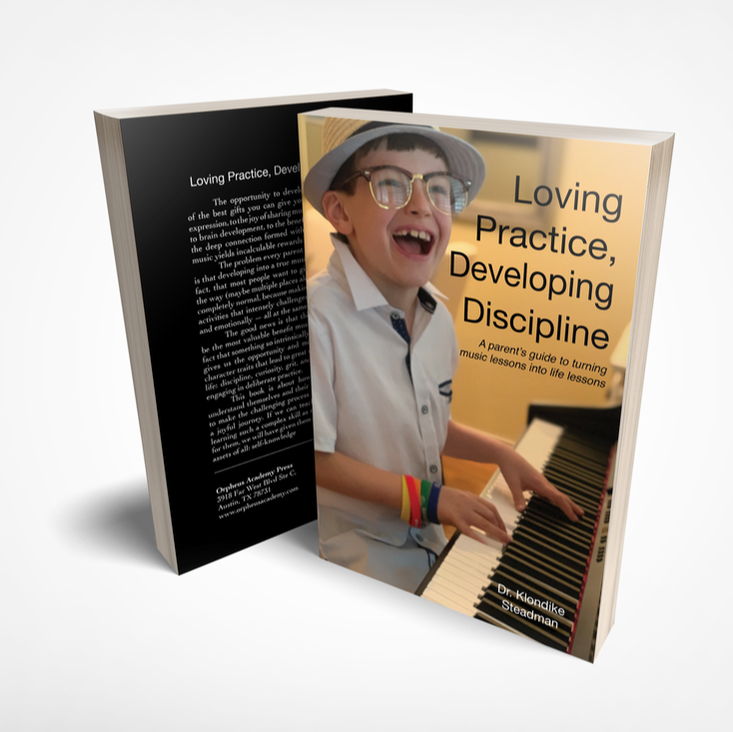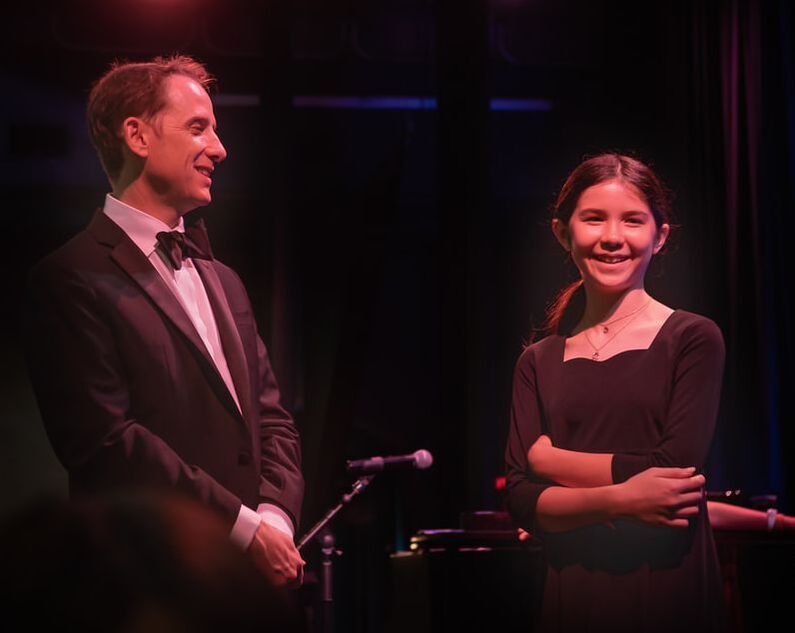|
A parent's guide to turning music lessons into life lessons
Learning music is the perfect opportunity to connect to your passion and develop into a happy, disciplined person. In this book you will learn how to:
|
SYNOPSIS
The opportunity to develop musical talent is one of the best gifts you can give your child. From personal expression, to the joy of sharing music through performance, to brain development, to the benefits of being in a band, to the deep connection formed with one's cultural heritage, music yields incalculable rewards to those who pursue it.
The problem every parent runs into sooner or later is that developing into a true musician is hard. So hard, in fact, that most people want to give up somewhere along the way (maybe multiple places along the way). And this is completely normal, because making music is one of the few activities that intensely challenges us physically, mentally, and emotionally — all at the same time. So, as any professional musician will tell you, sooner or later you are going to want to quit.
The good news is that this intense difficulty itself may be the most valuable benefit music has to offer. The very fact that something so intrinsically rewarding is so difficult gives us the opportunity and motivation to develop the character traits that lead to great success and happiness in life: discipline, curiosity, grit, and, ultimately, the skill to transform ourselves through practice.
This book is about how our children can learn to understand themselves and their own internal motivators to make the challenging process of becoming a musician a joyful journey. If we can teach our children to engage in learning such a complex skill as music in ways that work for them, we will have given them one of the most powerful assets of all: self-knowledge.
The problem every parent runs into sooner or later is that developing into a true musician is hard. So hard, in fact, that most people want to give up somewhere along the way (maybe multiple places along the way). And this is completely normal, because making music is one of the few activities that intensely challenges us physically, mentally, and emotionally — all at the same time. So, as any professional musician will tell you, sooner or later you are going to want to quit.
The good news is that this intense difficulty itself may be the most valuable benefit music has to offer. The very fact that something so intrinsically rewarding is so difficult gives us the opportunity and motivation to develop the character traits that lead to great success and happiness in life: discipline, curiosity, grit, and, ultimately, the skill to transform ourselves through practice.
This book is about how our children can learn to understand themselves and their own internal motivators to make the challenging process of becoming a musician a joyful journey. If we can teach our children to engage in learning such a complex skill as music in ways that work for them, we will have given them one of the most powerful assets of all: self-knowledge.
DISCIPLINE IS LIKE STARTING A FIRE
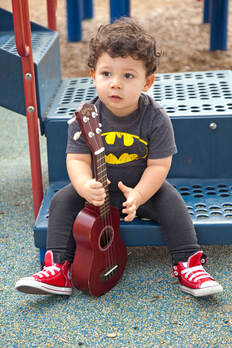
At the beginning of any skill, the desire to practice can be like trying to start a fire with wood that is too damp. With music, we want to feel the warmth of expression and the comfort of knowing we can play anything we set our minds to, but everything feels like a struggle. As parents, we can feel like we are trying to light a fire inside our child, but it keeps sputtering and going out.
Allow me to take this analogy a little further: When we light a real fire, we build it with paper and kindling. We give it plenty of room for air and good fuel to grow. We don’t throw a big heavy log on a young fire before it is ready. Once the flames are going strong, we can relax and just keep feeding it from time to time, enjoying the warmth. However, if the fire burns down again, we will need to return to the rebuilding process with care.
The initial period of learning must be approached thoughtfully and with great skill. This is why Sophia Gilmson, head of the piano pedagogy program at The University of Texas at Austin, is fond of saying, “If I could make one rule, it would be this: Only the best teachers are allowed to teach beginners!” It takes great expertise to stoke the passion and build the skills needed for great art in a young child. Great music, appropriate techniques, gradually increasing performance opportunities, sincere praise, clear direction and feedback on how to improve — these things are the dry wood and kindling from which the fire is built. I believe the spark for creativity exists in every child; we simply need to prepare the fuel.
Allow me to take this analogy a little further: When we light a real fire, we build it with paper and kindling. We give it plenty of room for air and good fuel to grow. We don’t throw a big heavy log on a young fire before it is ready. Once the flames are going strong, we can relax and just keep feeding it from time to time, enjoying the warmth. However, if the fire burns down again, we will need to return to the rebuilding process with care.
The initial period of learning must be approached thoughtfully and with great skill. This is why Sophia Gilmson, head of the piano pedagogy program at The University of Texas at Austin, is fond of saying, “If I could make one rule, it would be this: Only the best teachers are allowed to teach beginners!” It takes great expertise to stoke the passion and build the skills needed for great art in a young child. Great music, appropriate techniques, gradually increasing performance opportunities, sincere praise, clear direction and feedback on how to improve — these things are the dry wood and kindling from which the fire is built. I believe the spark for creativity exists in every child; we simply need to prepare the fuel.
“Only the best teachers are allowed to teach beginners!”
|
SELF-ESTEEM
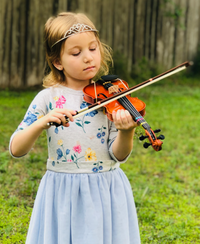
Self-esteem does not come from praise or outside recognition. It comes from the ability to perform a challenging task well at objective levels of excellence. In short, it is being a person that you yourself would esteem. Knowing you have worked long and hard to achieve the skill to do something well is one of the greatest feelings anyone can have.
I am no believer in the self-esteem movement — in which every child is rewarded equally for mediocre work — but there is now substantial evidence that self-esteem resulting from objective excellence is one of the most important indicators of future success. Children who believe they are capable of greatness in one area are more likely to believe that they can achieve great things in other areas, to take on greater challenges, and to therefore gain additional skills of which they can be justifiably proud. It is a positive learning cycle that all parents wish for their children.
I would caution, however, that over-emphasis on self-esteem without the virtues of love and humility can easily give rise to an inflated ego, hyper-competitiveness, and self-judgment. The ideal attitude for any musician is humility before the awesomeness of artistic expression, which transcends our personal ego. It is good to recognize how much work your child put into their music, but it’s just as important to encourage in them a love of the music. Many students who have become overly concerned with being the best at their instrument are devastated when they hear someone whom they perceive as “better.” Ideally, they would find excellence in others inspiring and motivating, not threatening. Maintaining this balance is a challenge in my own family, where my daughter is highly driven and very attracted to competition. Our intention (though I know I often fall short) is to ask her what she loves about each piece and to share our own love of music, from Queen to Stravinsky. This, at least, sends a message that we are interested in beauty, not perfection.
I am no believer in the self-esteem movement — in which every child is rewarded equally for mediocre work — but there is now substantial evidence that self-esteem resulting from objective excellence is one of the most important indicators of future success. Children who believe they are capable of greatness in one area are more likely to believe that they can achieve great things in other areas, to take on greater challenges, and to therefore gain additional skills of which they can be justifiably proud. It is a positive learning cycle that all parents wish for their children.
I would caution, however, that over-emphasis on self-esteem without the virtues of love and humility can easily give rise to an inflated ego, hyper-competitiveness, and self-judgment. The ideal attitude for any musician is humility before the awesomeness of artistic expression, which transcends our personal ego. It is good to recognize how much work your child put into their music, but it’s just as important to encourage in them a love of the music. Many students who have become overly concerned with being the best at their instrument are devastated when they hear someone whom they perceive as “better.” Ideally, they would find excellence in others inspiring and motivating, not threatening. Maintaining this balance is a challenge in my own family, where my daughter is highly driven and very attracted to competition. Our intention (though I know I often fall short) is to ask her what she loves about each piece and to share our own love of music, from Queen to Stravinsky. This, at least, sends a message that we are interested in beauty, not perfection.
PERSONALIZED DISCIPLINE

I am reminded of an analogy I once read (I can’t remember where) used by a Zen master to teach his disciples to accept their own unique personality. We are each born with a spirit that is like a horse we ride throughout life. Some horses are swift, some slow and steady, some easy to train, and some stubborn. Too often we waste time wishing that we had been born with a different personality than we have — one that is swift, sure-footed, and easily follows our commands. If we learn to ride the horse we are on, we not only increase our chances of getting somewhere, but we may even enjoy the ride! In other words, it is not the horse, but the rider with whom we should be concerned. Our mission in life is to learn how to best work with our own personality.
"You have to know your child and then help them to know themselves."
|
ISHAAN'S STORY
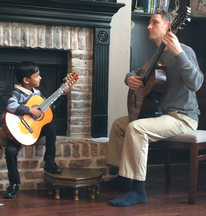
...Over the past three years, Ishaan has learned over 100 folk songs as well as popular and classical melodies, through which he mastered the basic techniques of the guitar, came to understand the underpinnings of melody and rhythm, and deepened his love of music. He has shown particular interest in improvisation and composition, so whenever we get a new concept, I play improvisation games with him, and he often comes back to the lesson with a new composition he has created. At the end of the second year, he performed a “Home Concert” for his friends, neighbors, and family (even some from halfway across the country). His focus through the concert and his delight when it was over was something I will always cherish witnessing. His parents reported that he wouldn’t set his guitar down for the entire weekend after that concert.
The following year, he made a CD of his favorite songs, and the year after that, he travelled with a number of students from our school to perform at Carnegie Hall in New York City, both solo and as part of a large ensemble.
For each of these goals, he had to stretch his abilities both physically and mentally, often undertaking practicing twice a day for a period of months leading up to the goal.
... So how has Ishaan developed such an exceptional level of skill and the willingness to engage in intense practice for extended periods of time each day when so many other children find it a struggle just to learn “Twinkle, Twinkle Little Star”? The answer to his success is a summary of everything that I will present in this book:
• He began by falling in love with music and nurturing that love throughout his journey...
• His parents established a regular but manageable practice schedule (10–15 minutes a day to start, growing gradually over the years).
• His parents were willing to try many different approaches to making practice for a four-year-old fun until they settled into what worked for them.
• He learned solid technical, musical, and practice habits from an early age so his learning would not be impeded.
• He made musical friends at his music school and his regular school with whom he could play, so music was a social as well as personal experience. • He was able to associate music with his life in ways that were meaningful and powerful.
• He experienced numerous rewarding performance experiences in which his hard work was rewarded by the experience of playing at the top of his abilities and having a large audience appreciate his music.
• His entire family, including grandparents, aunts, uncles, and cousins, support his music study and genuinely appreciate what a powerful gift he has.
It is easy to look at highly successful people in any field and assume that they have some hidden talent or special character trait that we do not have. The research, however, seems to point in a different direction: Exceptionally “talented” people, whether they be musicians, athletes, or scientists, are more likely to share a sequence of experiences than a character trait. Experiences that support and stoke their passion, teach them to be disciplined, help them master expert practice techniques, and experience the success of their efforts are much more important than any physical or intellectual predisposition.
Talent is not merely a genetic predisposition, but a heightened rate of learning due to neural and physical advantages — advantages you have the power to gain. Since disciplined practice over time improves the structure of the brain, when you engage in it, you aren't just “reaching your potential” — you are increasing your potential. So while Child A might have some neural advantages over Child B at age one, by the age of seven, as the result of environment, experience, and effort, Child B might have rearranged her neural network to be more sensitive to musical sounds and have a vastly superior musical mind to Child A. Therefore, at this point, we would have to say seven-year-old Child B is “more talented.”
What this means is that a joyful and successful pursuit of excellence is within the purview of all who wish to follow a path of discipline. Furthermore, truly effective discipline is not a painful litany of unpleasant tasks, but the creative process of finding what works for us and sticking with it over a long period of time. In short, it is a process that can bring happiness and success to our lives in all areas.
The following year, he made a CD of his favorite songs, and the year after that, he travelled with a number of students from our school to perform at Carnegie Hall in New York City, both solo and as part of a large ensemble.
For each of these goals, he had to stretch his abilities both physically and mentally, often undertaking practicing twice a day for a period of months leading up to the goal.
... So how has Ishaan developed such an exceptional level of skill and the willingness to engage in intense practice for extended periods of time each day when so many other children find it a struggle just to learn “Twinkle, Twinkle Little Star”? The answer to his success is a summary of everything that I will present in this book:
• He began by falling in love with music and nurturing that love throughout his journey...
• His parents established a regular but manageable practice schedule (10–15 minutes a day to start, growing gradually over the years).
• His parents were willing to try many different approaches to making practice for a four-year-old fun until they settled into what worked for them.
• He learned solid technical, musical, and practice habits from an early age so his learning would not be impeded.
• He made musical friends at his music school and his regular school with whom he could play, so music was a social as well as personal experience. • He was able to associate music with his life in ways that were meaningful and powerful.
• He experienced numerous rewarding performance experiences in which his hard work was rewarded by the experience of playing at the top of his abilities and having a large audience appreciate his music.
• His entire family, including grandparents, aunts, uncles, and cousins, support his music study and genuinely appreciate what a powerful gift he has.
It is easy to look at highly successful people in any field and assume that they have some hidden talent or special character trait that we do not have. The research, however, seems to point in a different direction: Exceptionally “talented” people, whether they be musicians, athletes, or scientists, are more likely to share a sequence of experiences than a character trait. Experiences that support and stoke their passion, teach them to be disciplined, help them master expert practice techniques, and experience the success of their efforts are much more important than any physical or intellectual predisposition.
Talent is not merely a genetic predisposition, but a heightened rate of learning due to neural and physical advantages — advantages you have the power to gain. Since disciplined practice over time improves the structure of the brain, when you engage in it, you aren't just “reaching your potential” — you are increasing your potential. So while Child A might have some neural advantages over Child B at age one, by the age of seven, as the result of environment, experience, and effort, Child B might have rearranged her neural network to be more sensitive to musical sounds and have a vastly superior musical mind to Child A. Therefore, at this point, we would have to say seven-year-old Child B is “more talented.”
What this means is that a joyful and successful pursuit of excellence is within the purview of all who wish to follow a path of discipline. Furthermore, truly effective discipline is not a painful litany of unpleasant tasks, but the creative process of finding what works for us and sticking with it over a long period of time. In short, it is a process that can bring happiness and success to our lives in all areas.
ABOUT DR. KLONDIKE STEADMAN
|
Dr. Steadman is a pioneering guitarist, entrepreneur, educator and author. He has taught at the University of Texas Butler School of Music, served on the faculty of Southwestern University and the Classical Minds Guitar Festival. As the co-founder and director of Orpheus Academy of Music with his wife, Wendy Kuo, he has built one of the most successful music programs for kids in the country. He is the author of The Complete Guitar and The Complete Guitar For the Older Beginner, which is used by many private teachers and as the textbook for guitar classes at colleges and universities across the US. His presentation The Student Chamber Music Project, at the Music Teachers National Association was very well received and has sparked a great deal of additional research and music which is now used in chamber music programs. His work using the Kodaly approach in private lessons has led to the creation of a method book “Adventures Through Sound,” publication in music teaching journals as well as presentations to music teacher organizations.
Klondike believes that, with the right guidance, achieving musical excellence can be fun and rewarding for everyone. His achievements as a teacher and performer in the music field have made him a highly sought after instructor in the Austin area. He has won top prizes in many performance competitions including the Music Teachers National Association Competition, The University of Texas Concerto Competition and the Portland International Guitar Competition. He has appeared in concerts across the United States both in recital and as an orchestral soloist. Klondike’s students have been accepted to universities as music majors and have won prestigious scholarships and competitions including the Texas Guitar Competition, the Young Artists Concert and the Asian American Challenge Cup. In 2001 Klondike founded the Educational Outreach Program for the Austin Classical Guitar Society to provide expert private guitar instruction to low income high school students free of charge. This program continues to provide quality music instruction with guitar students regularly giving public concerts as soloists and in guitar ensembles. In 2003 Klondike received the prestigious Studio Fellowship Award from the Music Teacher’s National Association for his work opening the Orpheus Academy of Music. |
PRAISE FOR "LOVING PRACTICE"
"Klondike Steadman, whose work as an artist, teacher, and thinker I have long admired, has created something wonderful and meaningful in Loving Practice, Developing Discipline. There’s insight and wisdom here that can only come from a perceptive, focused mind with a tenacious devotion to the flourishing of children—in the arts and in life."
- Dr. Robert Duke, Director of Music and Human Learning at UT Austin and co-host of "Two Guys on Your Head" podcast.
"This is a wonderful book. I couldn't put it down, I laughed out loud and I kept nodding my head "yes." Most of all, I felt guided by a wise person who had spent his 10,000 hours observing humanity, could describe his journey in a compelling way, could share careful research in a way that opened my eyes to new insights into my own performing and teaching, could give me realistic ways to implement these new realizations into my own life in ways that were not "one-size-fits-all."
- Barbara Kreader-Skalinder, co-author of over 40 titles, sought-after piano clinician and Keyboard Consultant for Educational Keyboard Publications to the Hal Leonard Corporation
- Dr. Robert Duke, Director of Music and Human Learning at UT Austin and co-host of "Two Guys on Your Head" podcast.
"This is a wonderful book. I couldn't put it down, I laughed out loud and I kept nodding my head "yes." Most of all, I felt guided by a wise person who had spent his 10,000 hours observing humanity, could describe his journey in a compelling way, could share careful research in a way that opened my eyes to new insights into my own performing and teaching, could give me realistic ways to implement these new realizations into my own life in ways that were not "one-size-fits-all."
- Barbara Kreader-Skalinder, co-author of over 40 titles, sought-after piano clinician and Keyboard Consultant for Educational Keyboard Publications to the Hal Leonard Corporation

